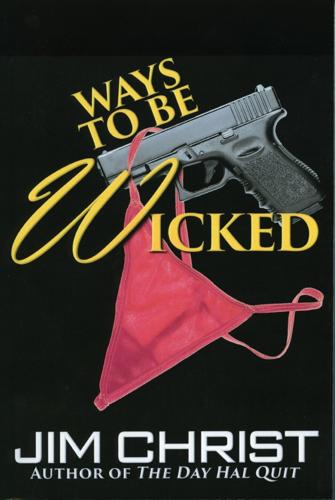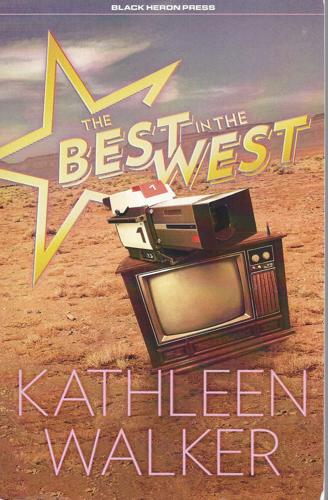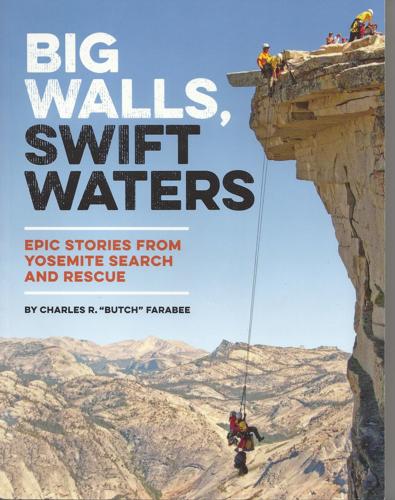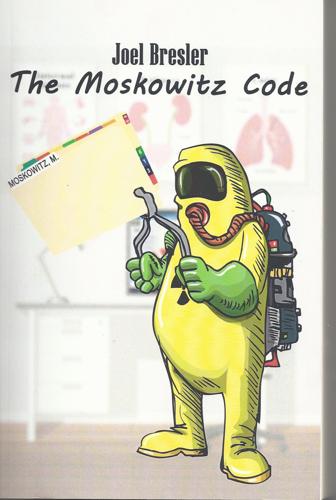“Big Walls, Swift Waters: Epic Stories from Yosemite Search and Rescue” by Charles R. “Butch” Farabee (Yosemite Conservancy;$22.99)
A universal mantra among search and rescue units is, “the mountains do not care” – a harsh reality that Farabee supports through sharp, breathtaking photographs, detailed illustrations, crisp text and personal anecdote. Established as a National Park in 1890, Yosemite’s early law enforcement consisted of curtailing logging, grazing (John Muir declared sheep “hooved locusts”) and poaching. But, shortly, visitors descended and, in the ensuing years, incidents ranged from fatigued grandmothers to dramatic El Capitan rescues. Most accidents happen during day hikes on well-traveled trails and end favorably, but deaths (and disappearances) occur – as witnessed by the grim photographs of the body-bag laden stretchers. Mindfulness and precautions are necessary defenses, and Farabee concludes this wild ride with safety tips, a glossary and notes. Experience this snapshot view the Yosemite Search and Rescue team’s life on the edge. No gear needed.
Big Walls won the 2017 National Outdoor Book Awards. A Tucson resident, Farabee retired after 34 years from the National Park Service and is the author of four previous books.
Vicki Ann Duraine
“Éxodo”
By Gene Isaacs. (Says It All Publishing; $15.85)
Alejandro (Alex) Fuentes has charisma normally not found in a Jesuit Brother. Raised in a series of foster homes, and after a stint in the Marine Corps and a lost relationship, Alex finds stability in the seminary life. Tall, elegant, fair-haired and sexy, combining his combat skills with his contemplative calling, he spends much of his time in various guises gathering information. His assignments have spanned the decades and the continents, and the latest one lands him in Tucson on the trail of a rogue priest conducting mass in the Presidio. But Alex is slippery and Bishop Kierzek, protective of his Tucson diocese, suspects that the “Vatican snoop” has hidden agendas.
Set against the Southern Arizona landscape, this novel is a detailed, complex and atmospheric thriller, seeped in history, backstory, doctrine, regional color and occasional illicit sex. The writing is crisp and, though excessive detail occasionally muddies the narrative, it is a satisfying read.
Isaacs is also the author of “Metamorphosis 1983,” and is working on a novel highlighting the Southwest border issues.
Vicki Ann Duraine
“The Moskowitz Code”
By Joel Bresler. (Tasfil Publishing, LLC. $12.99; $2.99 Kindle)
With “The Moskowitz Code,” author Joel Bresler offers a frothy blend of comedy and social commentary on how precariously we are balanced in the digital landscape. In a style his publisher categorizes as “literary silliness,” Bresler tells the story of Myron Moskowitz (“Mike” to the world, but not to his mother), a man who lives an uneventful sort of life: his wife is inattentive, his mother is overbearing, and his job is unfulfilling, but he shuffles gamely along until the day an incorrect diagnostic code is mistakenly typed into his medical record, assigning to him a terminal — and potentially very expensive — disease. In quick succession, Moskowitz loses his job, his health coverage, and ultimately his identity when his life insurance company decides it’s easier to erase him than it is to correct the computer error that caused the problem in the first place. It sounds nightmarish, and not entirely far-fetched, but Moskowitz views his predicament with a sort of ironic detachment and his efforts to transcend non-personhood and make his way back onto the societal grid are hilarious. Fans of droll narrative and witty dialog in the style of P.G.Wodehouse will enjoy Bresler’s comic take on the way we live now.
Helene Woodhams
“The Best in the West”
By Kathleen Walker. (Black Heron Press. $15.95)
The second-best local TV news program in Phoenix (the self-styling of “Best in the West” is more bravado than fact) provides the setting for this fictional look back at TV journalists struggling to win hearts and minds and market share in the late 1970s. Fans of newsroom drama will recognize the stock characters— the young idealist who ardently believes delivering the truth is the highest calling, the jaded news veteran who’s been disappointed too many times, and the evil, self-aggrandizing anchorman — but they are deftly portrayed, and their interesting backstories will keep readers turning pages. Tucson author Kathleen Walker, herself a TV newsroom veteran, recalls a time 40 years before #MeToo, when entertainment began to vie with solid reporting for precedence on the local affiliates, and women came aboard as new and not-necessarily-welcome members of the news team. There’s an authentic feel to Walker’s fiction, and genuine sympathy for the dedicated reporters serving at the pleasure—and the whim— of the all-male club that was, (and perhaps still is) the nightly news.
Helene Woodhams
“Pinkwashed”
By Starr Sanders (CreateSpace, $12.99)
Greenville City Councilwoman Peggy Glass hates the color pink. She’s always hated pink, she declares, “in all its forms. From dusty rose to Pepto Bismol.” Neither is she all that fond of pink’s relation to fundraising for breast cancer research, blasting “every corporation in America sucking on the pink marketing teat.”
As “Pinkwashed” opens, narrator Glass is struggling through a course of chemotherapy for breast cancer. She’s also in jail awaiting trial for hacking into a corrupt oil company’s files. With her in lock-up, it falls to her loyal fans and her fierce family to concoct ways to expose what she’d been researching: a fracking contamination cover-up, and ties among the local breast cancer foundation, the town’s oil and gas company, and her political opponent. It falls to her lawyer to get her off. It falls to her to keep her politician’s mouth shut.
Cancer treatment and environmental pollution hardly seem the stuff of an uplifting read, but retired Tucson teacher — and breast cancer survivor — Starr Sanders makes it a kick. She takes on the oil and gas industry, the “breast cancer industry,” the nexus of corporations and politics, and the ethics of political ambition. At least one premise — that fracking drill bits be painted pink for Breast Cancer Awareness — has its own logical absurdity. Dialogue is snappy. Emotion is honest. Her Peggy Glass is irreverent, gutsy, and funny.
And Glass’ descriptions of that abhorred pink? Inspired. When someone tries to dress her in a symbolic pink suit, she calls up the perfect little girly-girly shade: it’s “the pink of unicorn farts.”
Christine Wald-Hopkins
“Ways To Be Wicked”
By Jim Christ (Joseph and Associates, Pub., $12)
There’s something about this mystery/thriller by former Tucson educator Jim Christ that takes you right back to high school. Think bullies, gym dances, broken hearts. And there’s something about this mystery/thriller that takes former teachers like this reader right back to high school. Think teaching bullies, supervising gym dances, consoling broken hearts. Then there’s the wild card of navigating the sometimes-adolescent behavior of adults who work with kids, and the often-adult behavior of kids who work adults.
Enrique Tavish, assistant principal in a tough high school on Tucson’s south side, is the AP on duty when a popular senior shows up half-naked and dead in a men’s restroom on campus. Bright, beautiful, ambitious, flirtatious, and irresistible to both kids and faculty, the girl had garnered not a shameless passing notice from Tavish himself. Believing the police missed clues, he and the school resource officer set about to track down the killer. The girl was Latina, a leader in the school, and Tavish — who grew up in the same neighborhood but suppressed his Mexican roots — suspects gang activity with Mexican connections. When he wades in and stirs it up, Tavish catalyzes action that endangers not just himself but also his young family.
Teacher and administrator Christ knows his schools, district policies, politics and history; he’s created a flawed but sympathetic central character who goes from wielding a walkie-talkie to wielding a Glock; and he sets up a suspenseful shootout en route to Mexico. Longtime Tucson folks will enjoy ID’ing people and places Christ draws from and occasionally skewers, and this one looks forward to more Enrique Tavish.
Christine Wald-Hopkins











